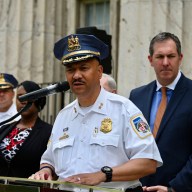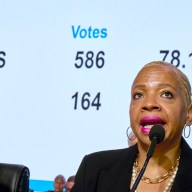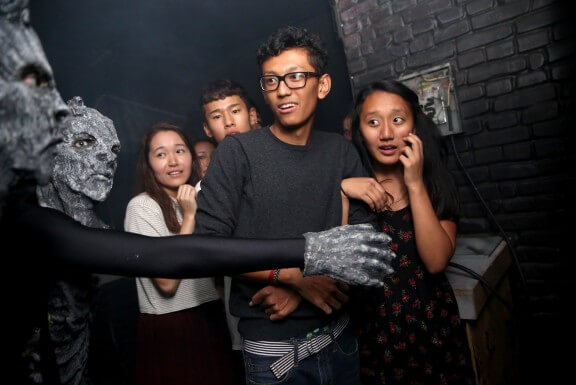 With a degree in political science, actor Sebastian Arcelus knows his stuff when it comes to the justice system — especially as it’s depicted in his latest Broadway gig, “A Time to Kill.”
With a degree in political science, actor Sebastian Arcelus knows his stuff when it comes to the justice system — especially as it’s depicted in his latest Broadway gig, “A Time to Kill.”
Credit: Jim Cox
We met with “House of Cards” and musical theater star Sebastian Arecelus just days before the opening night of John Grisham’s “A Time to Kill” on Broadway. In this courtroom drama, he plays Jake Brigance, an idealistic lawyer defending a man who admits to killing his daughter’s rapists, and is subsequently on trial for the death penalty. Arcelus spoke with us about the courtroom drama’s controversial topics, how the audience becomes the jury and how he personally feels about vigilante justice.
Many people know you from Netflix’s “House of Cards.” Did that feel like a risky move, to come from a Broadway background and join an Internet series?
Well, I don’t think any of us necessarily thought of it as a risky thing. When you look at who is doing it and who is involved creatively, it sort of didn’t matter how it was being delivered. Getting to do “House of Cards” and to have that be the first major series that I was part of as a regular is amazing. We have been hard at work on Season 2 right now, we’re just wrapping that up in the next couple of weeks, and we’re hoping that it satisfies this rabid viewership [from Season 1]. I think at the end of the day, just getting to be a part of good work is the best part — whether it be a musical, a play or “House of Cards.”
Many people know “A Time to Kill” best from the 1996 film. Is that intimidating?
I’m a fan of the film and have seen it a number of times; it’s on TNT all the time — it’s great that it exists. We are glad to be able to provide any viewer of the film or person who’s read the book with a new fresh look at the story. … I don’t think [book writer Rupert Holmes] has seen the movie, to be honest with you. Even so, Rupert has been given creative license to expand on that in ways that might be more inherently theatrical for purposes of this production. To that end, there are a couple of plot twists that Rupert has used that even Mr. Grisham himself said, “Gosh, I wish I had thought of that.”
But the book was your jumping-off point?
I’ve gotten to spend some time with Mr. Grisham, and he’s the best lesson on Jake Brigance because that’s who he is, in some sense. That was his most autobiographical book, and he was a lawyer when he wrote it. He was a young upstart trial lawyer looking for this kind of a case. You can’t beat that. When you think about him writing that back then, and then you meet him now, there’s just an essence about him that seems very Jake-like. But yeah I did read the book, and I constantly go back to it too, rereading a passage here or there, trying to find something new. But we are working off of the play as our primary text.
It’s a familiar progression, these days: novel, movie, play.
I think it’s a natural next step for such a wonderful and dramatic story, to put it onstage, and have that group of 900 people feel it together. And that’s also one of those things that changes every night, how our audience might respond. That [speaks to] the very question at hand: Despite a system where justice is meant to be blind and objective, when you put that system in the hand of a subjective jury — or viewer or citizen — how does this change that system? We experience that on a nightly basis. There are people who walk out thinking the verdict should be reversed; there are people who walk out feeling like justice was served. But in this particular story, depending upon how you look at it, justice is served both ways.
What are your own feelings about the play’s outcome?
I think I have to remove myself from the equation as much as possible. I have my own subjective views as to right and wrong, and what I might do in a situation like this in the place of [accused murderer] Carl Lee. You have to sort of step back nightly, have an honest, open, non-preemptive approach to the story — because [Jake] knows it’s a great opportunity, and he embraces that, but only to find himself way in over his head and making mistakes left and right. It’s a classic case of a hero … not necessarily assuming the driver’s seat of his own story, until he finds himself having lost virtually everything and staring down the very real possibility of his client maybe being put to death on account of his incompetence. It’s a real challenge for him, and it’s a challenge for me to remove my opinions from the process.
But do you identify with the vigilante revenge quest that Jake’s defending?
It’s a difficult question to answer, because there are two obvious responses to it; we can’t have a society of chaotic, vigilante justice. That said, the question becomes personal when you are presented with this scenario in your own life. If your family is terrorized in the manner that Carl Lee’s is in this story, what would you do? It’s pretty obvious what any of us would want to do. Can we, should we, [that’s] another story. If the people closest to me were harmed in this way, naturally, I would want to take matters into my own hands. That said, is it clear that vigilante justice is the way to go? No! You can’t have a system like that. …. At the end of the day, how can you claim it’s a black and white situation — so to speak — when the entire system is predicated upon [a jury’s] subjective beliefs.
Even Jake doesn’t seem sure of his convictions at times.
Jake obviously has his own beliefs — keep in mind he is a white man growing up in Mississippi in the 1980s — and he likes to believe himself progressive, but in reality he’s a conservative guy who believes in the death penalty. While he likes to think he’s a friend of the black community, he has to learn things along the way as well.
What about you?
I do not [support the death penalty]. That said, it’s an interesting question to talk about in a vacuum, but if presented with a personal affront of that magnitude — I’d do it myself. In those situations, you’d like to think you’d be capable of doing it yourself, so it’s like you almost want to talk yourself up into some sort of vigilante justice. Yet if we did that, we’d have a chaotic, free-wielding, scary society.
And does that mean that we need more regulations, such as gun control laws?
We’re heading toward a very scary precipice (in terms of gun control). … It’s a very scary reality that we are an armed society of subjective free-thinkers. Some would argue that that’s our great freedom as a nation, and others would argue that puts us at great risk.
The timing of this play is interesting, in that it opens two days before the “A Time to Kill” sequel, “Sycamore Row,” which comes out on Oct. 22. Have you read that yet? Did Grisham send you an advance copy?
I’m hesitant to read it right now, because right now I’m tackling Jake’s current situation. … But I’m excited that [Grisham] is compelled enough to revisit these colorful characters. It’s fun to think that I’ll be able to take a look at what he thinks is [Jake’s] next battle.
It almost feels like a Grisham stage adaptation is long overdue.
[Grisham] has got such a great handle on dramatic stories, and he tells them in such a wonderful way, that I think it’s possible that we’re not the last [Grisham play]. It is a fun notion to think that his first novel, the first one he made while being a lawyer, and a favorite of many, is the one we’re getting to tackle here. It really does come alive onstage.

















